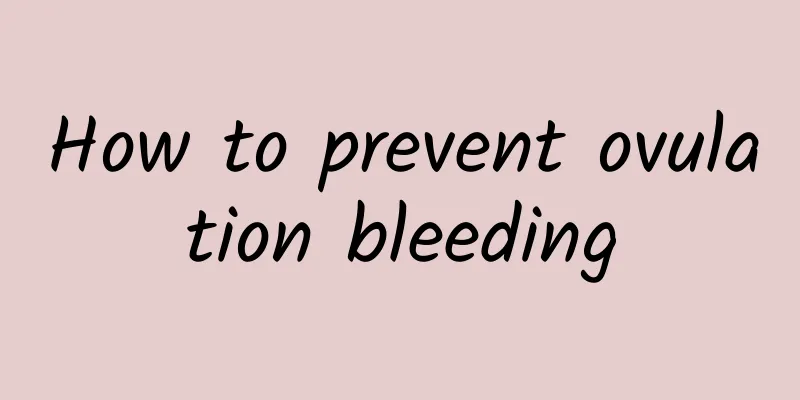How to prevent ovulation bleeding

|
Gynecological disease experts said that during the non-menstrual ovulation cycle of women, due to the temporary decrease in estrogen levels, the follicles rupture, causing the endometrium to stop growing, thus causing symptoms of endometrial shedding and bleeding. Similar to menstruation, women may feel pain in the lower abdomen when they bleed during ovulation, which is caused by the shedding of serous membranes and a small amount of blood accumulation in the pelvic cavity. However, it usually does not last for a long time, at most two or three days, and at least only a few hours. Precautions for ovulation bleeding: 1. Pay attention to hygiene during ovulation to prevent infection. Pay attention to the hygiene of the external genitalia. Do not have sexual intercourse during menstruation. Keep warm and avoid cold stimulation. Avoid overwork. People with heavy menstrual bleeding should avoid eating brown sugar. 2. Keep a happy spirit during the ovulation period, avoid mental stimulation and mood swings. Some people may experience lower abdominal distension, back pain, breast pain, mild diarrhea, fatigue, drowsiness, emotional instability, irritability or depression during the menstrual period. These are all normal and there is no need to be overly nervous. 3. During the ovulation period, underwear should be soft, made of cotton, and have good ventilation and air permeability. It should be washed and changed frequently, and the changed underwear should be placed in the sun to dry. 4. Don’t eat raw, cold, sour, spicy or other irritating foods during ovulation. Drink more water to keep your bowels open. People with hot blood should eat more fresh fruits and vegetables before menstruation, and avoid eating onions, garlic, leeks, ginger and other things that stimulate fire. People with qi and blood deficiency during the ovulation period must increase their nutrition, such as milk, eggs, soy milk, pork liver, spinach, pork, chicken, mutton, etc., and avoid eating raw and cold fruits and vegetables. Experts remind that occasional ovulation bleeding is not harmful to the body. Most of the time, it is caused by overwork or low immunity, which affects the endocrine balance. It can be treated without treatment. If ovulation bleeding occurs frequently, it should be considered to be caused by endocrine disorders. Under the guidance of a doctor, some estrogen supplements can be used. Once the amount of bleeding is too much or even exceeds the normal menstrual volume, you need to go to the hospital for a comprehensive examination to rule out the presence of other organic diseases. |
<<: Does long-term ovulation bleeding require treatment?
>>: What can I eat during ovulation bleeding?
Recommend
A complete list of soup recipes for replenishing qi and blood after abortion. What are the benefits of drinking chicken soup after abortion?
During pregnancy, due to various reasons, I had a...
Strict inspection of clenbuterol expanded to pig farms and pork products
The storm over the presence of ractopamine in Ame...
Women with cervical hypertrophy will basically experience menstrual symptoms
Women with cervical hypertrophy will basically ha...
What should I not eat after having my uterine fibroids removed? What should I not eat after having my uterine fibroids removed?
What can't you eat after having a uterine fib...
Heavy menstrual bleeding and uterine fibroids can cause anemia! Must supplement folic acid, iron, and vitamin C for balanced nutrition
Women who tend to have pale faces, frequent dizzi...
You need to know more about the symptoms of early pelvic inflammatory disease
If you can detect the symptoms of pelvic inflamma...
What factors are related to the occurrence of ectopic pregnancy in women
In our lives, the number of women with ectopic pr...
How to treat abnormal leucorrhea with foul odor
Abnormal leucorrhea with a foul odor may be a sig...
Coffee not only refreshes you, but also helps you lose weight and improve fatty liver! 5 good articles to take notes on, drink coffee healthily
Coffee is the golden drink of choice for many peo...
What should patients with pelvic peritonitis eat?
Pelvic peritonitis worries many women. The format...
What are the symptoms of mild pelvic inflammatory disease?
What are the symptoms of mild pelvic inflammatory...
What should I do if my period is delayed after medical abortion?
What should I do if my period is delayed after me...
Bananas and plantains, the "unparalleled duo" - have different roles in weight loss and bowel movements
Bananas can help you lose weight, and plantains h...
What causes ovulation bleeding?
Ovulation bleeding is usually caused by hormone f...
Three sodium-absorbent hot pot ingredients can cause swelling, three sodium-reducing fruits can help
Spicy hotpot, shabu-shabu, kimchi pot, curry pot,...









